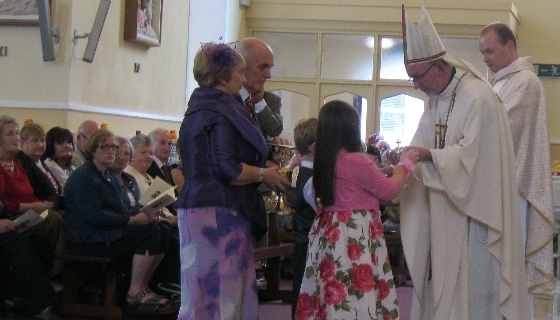Ordinations 2011
Posted on 26. Nov, 2011 in Carousel
You are asked to remember in your prayers the Irish College students ordained to the diaconate and priesthood during 2011.
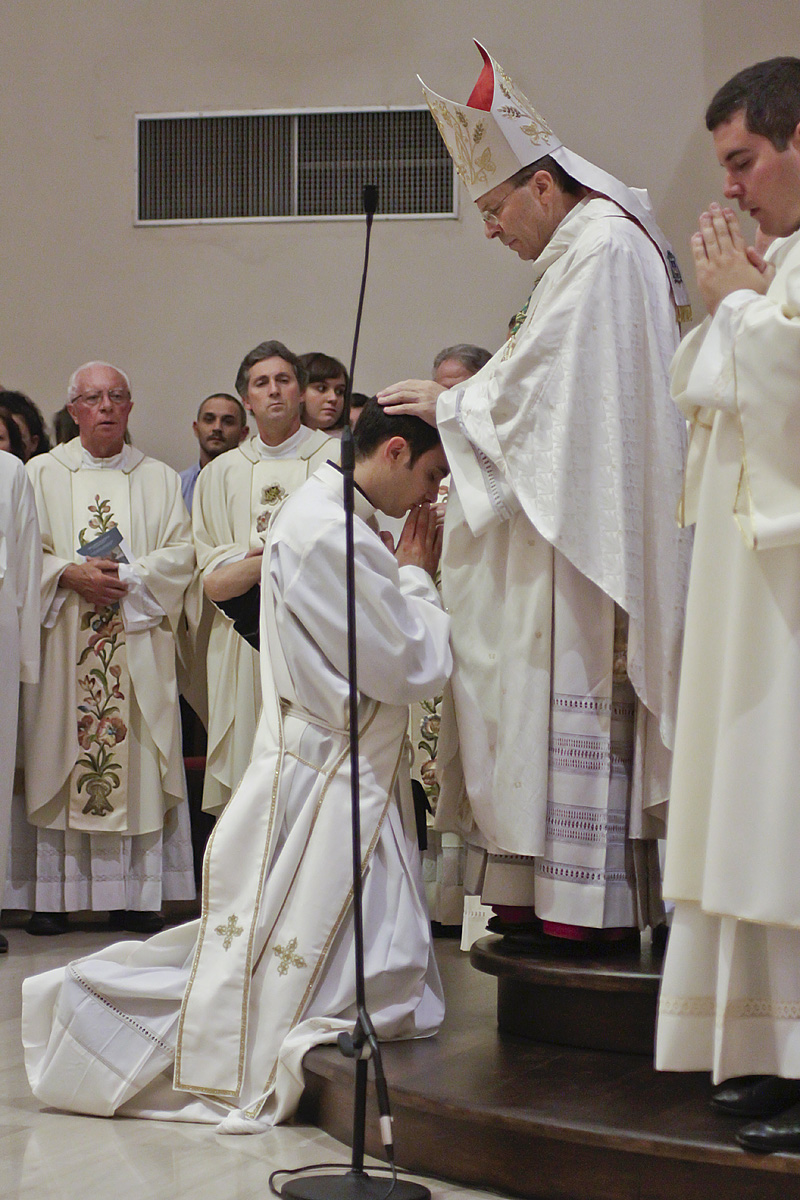
On the 1 October, 2011 Matteo Pucci, a deacon resident at the Pontifical Irish College, was ordained to the priesthood for the diocese of Fano-Fossombrone-Cagli-Pergola. Matteo spent one year in formation in the College as he began a Licentiate in Pastoral theology at the Lateran University. He was ordained by the Bishop of Fano-Fossombrone-Cagli-Pergola, Mons. Armando Trasarti, in the splendid Cathedral of Fano that was packed to capacity for the occasion. In a beautiful liturgy, the Bishop spoke movingly of the vocation of the Good Shepherd leading people to Christ and his selfless dedication to the people entrusted to his care. The ceremony was poignant for it was the Bishop’s first liturgy in his Cathedral after a serious illness. The warmth of which he spoke of the Good Shepherd was evidenced by the welcome the people extended to him as their chief pastor.
Don. Matteo celebrated a first Mass of thanksgiving the following day in his local parish that had nourished his faith commitment. In a joyful celebration surrounded by his family and friends, he paid tribute to all who had helped him become priest and thanked God for the gift of faith.
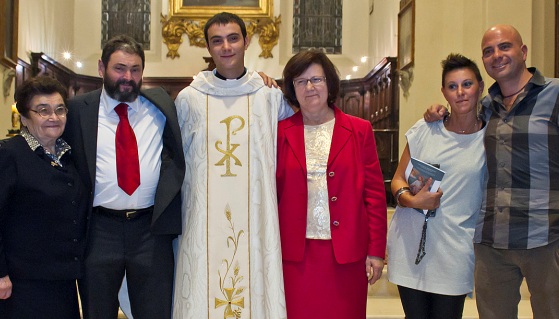
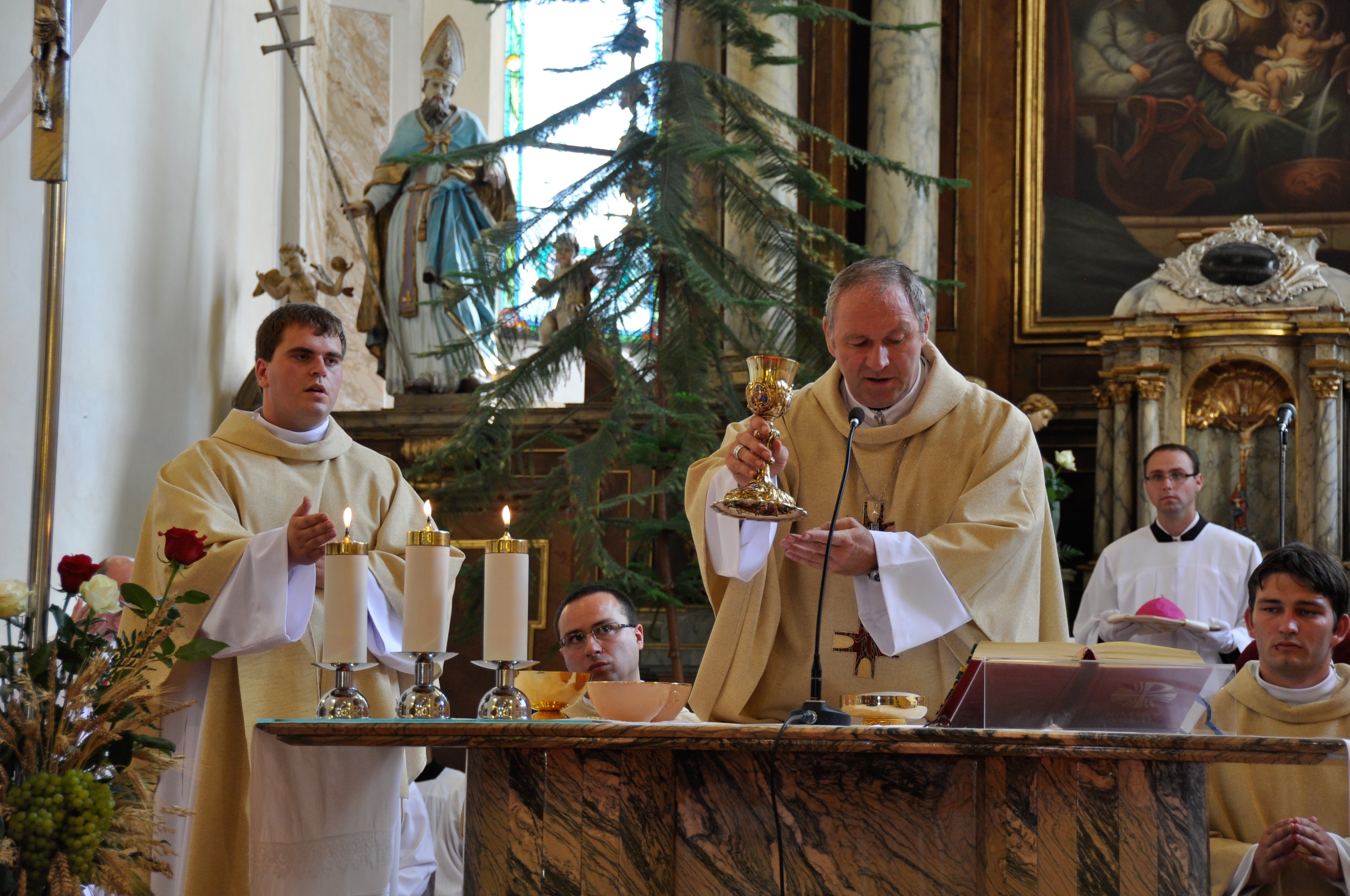
Milan Tomaga was ordained to the priesthood on Saturday 20 August 2011 in the Church of the Nativity of the Virgin Mary in Nová Baňa in the Diocese of Banska Bystrica (Slovakia). . This was the first priestly ordination to take place in Milan’s parish church. Sadly, Most Revd Rudolf Baláž, the bishop of the Diocese had died the previous week. Therefore the Archbishop of Trn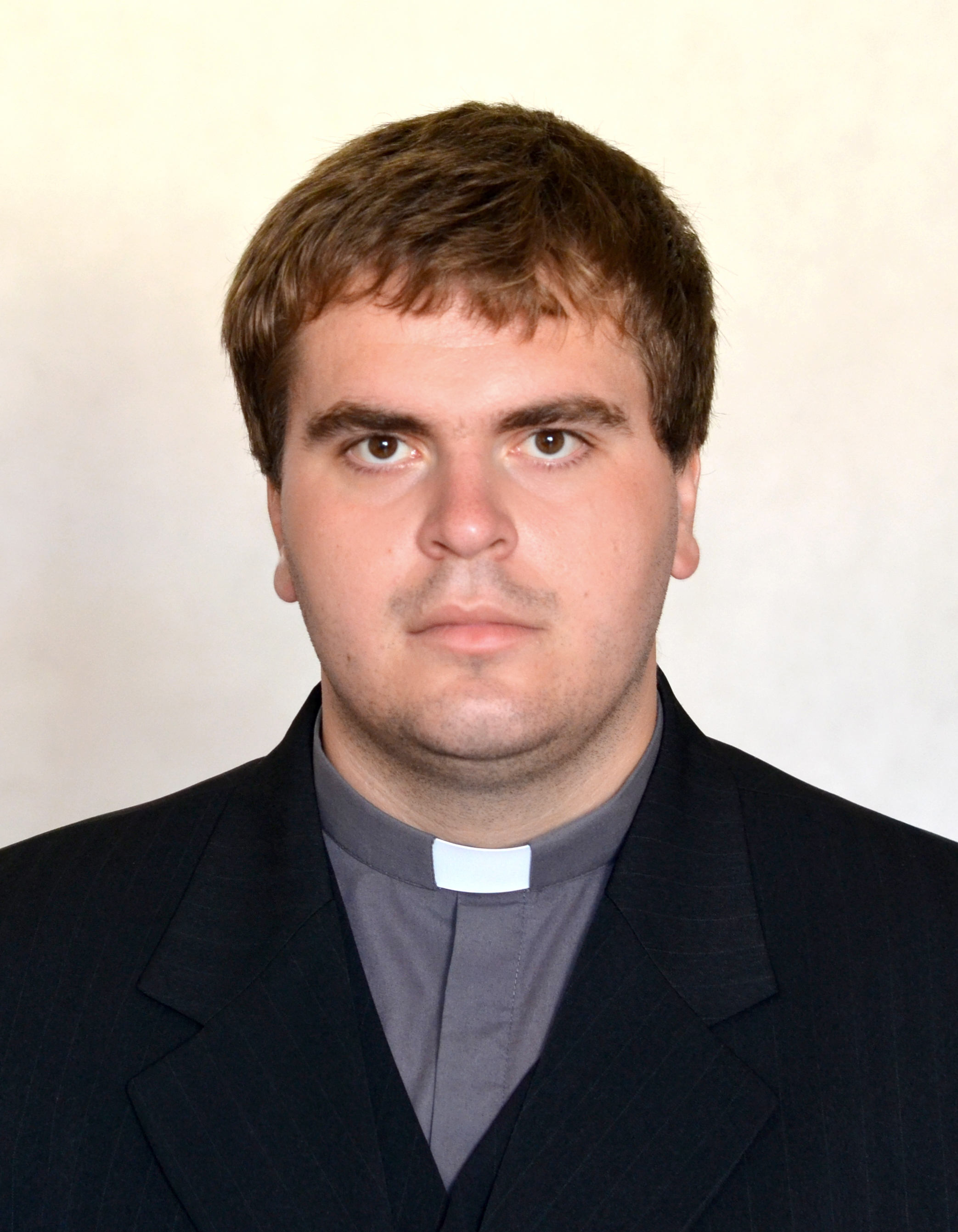 ava, Mons. Róbert Bezák was the ordaining prelate. Milan was the fourth priest ordained for his diocese this year, the other three were ordained last June.
ava, Mons. Róbert Bezák was the ordaining prelate. Milan was the fourth priest ordained for his diocese this year, the other three were ordained last June.
Milan celebrated his first Mass of thanksgiving on Sunday 21 August, 2011. In the course of the homily, Milan expressed his thanks to all who accompanied him along the road to ordination including the staff and the community of the Pontifical Irish College.
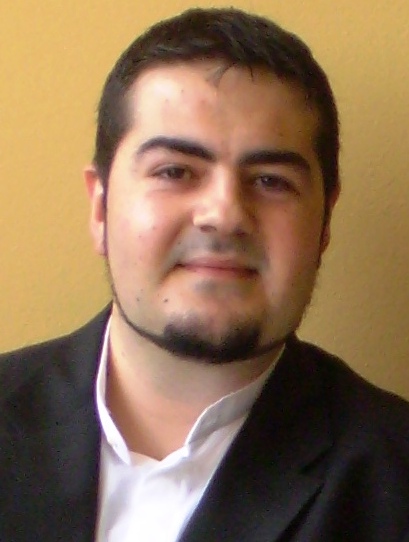 On 2 October, 2011 Daniele de Angelis was ordained deacon by the Bishop of Ascoli Piceno, Mons. Silvano Montevecchi, in Church of San Egidio in Ripaberarda, his local parish Church. It was an occasion of great joy for Daniele who received his seminary training at Fermo prior to the Irish College. Last year he began a Licentiate in moral theology at the Alphonsianum University that he will complete this academic year. One of a family of five, Daniele was joined by his parents, brother, sister and hundreds of friends and parishioners for the occasion. The liturgy was beautifully enhanced by the local choir and the involvement of the local faith community as well as many members of Azione
On 2 October, 2011 Daniele de Angelis was ordained deacon by the Bishop of Ascoli Piceno, Mons. Silvano Montevecchi, in Church of San Egidio in Ripaberarda, his local parish Church. It was an occasion of great joy for Daniele who received his seminary training at Fermo prior to the Irish College. Last year he began a Licentiate in moral theology at the Alphonsianum University that he will complete this academic year. One of a family of five, Daniele was joined by his parents, brother, sister and hundreds of friends and parishioners for the occasion. The liturgy was beautifully enhanced by the local choir and the involvement of the local faith community as well as many members of Azione 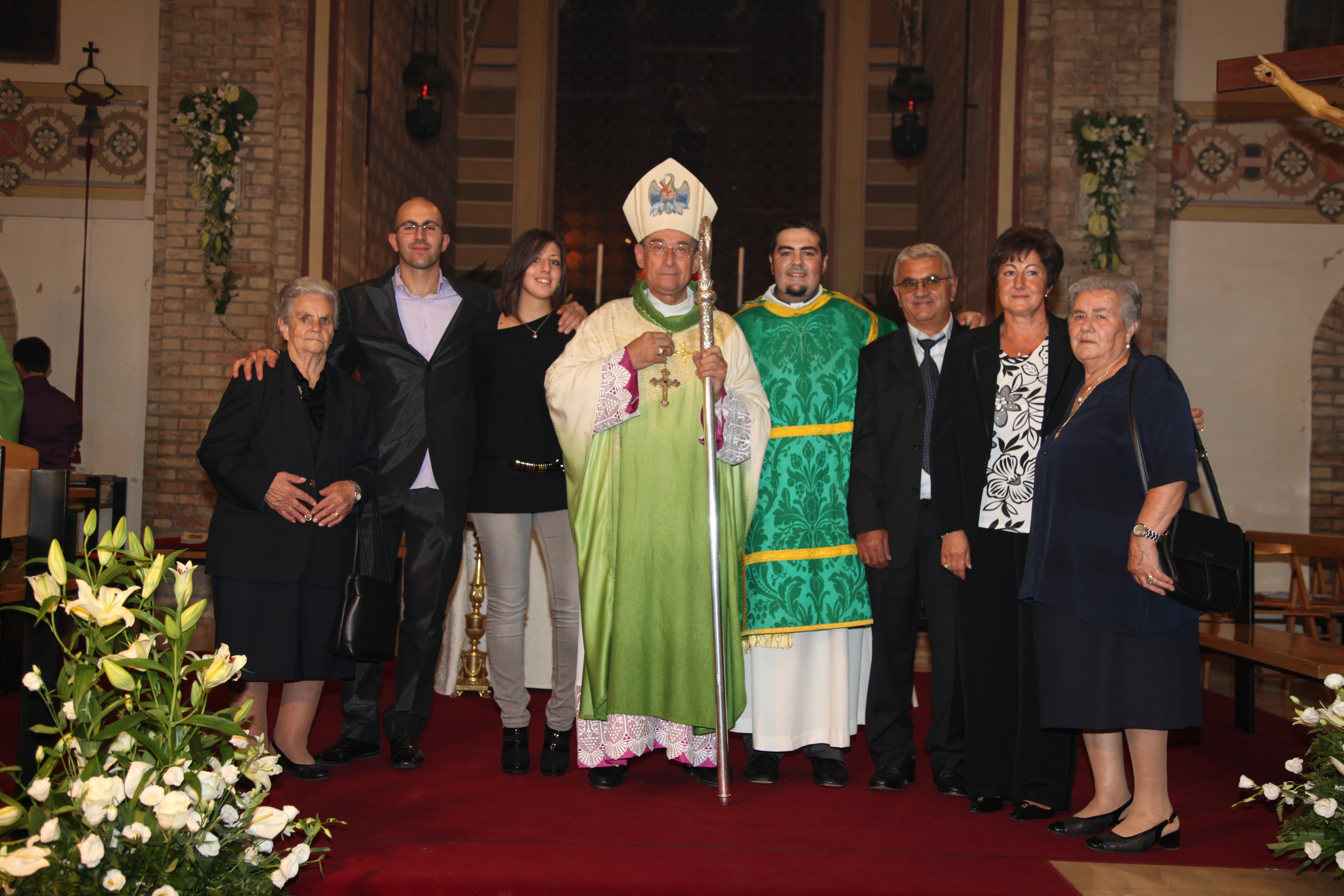 Cattolica.
Cattolica.
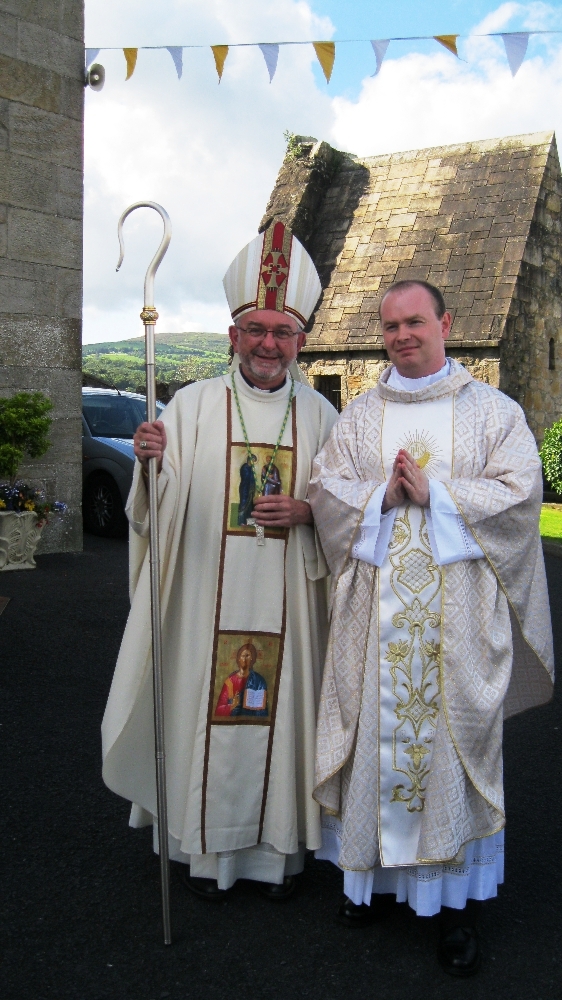 Bishop Kieran O’Reilly S.M.A. ordained Gerard Jones to the Priesthood on Sunday 21August in St. Flannan’s Church, Killaloe Co. Clare at 3.00pm. Fr Gerard celebrated his First Mass of Thanksgiving in St. Thomas’ Church, Bridgetown, Co. Clare on Monday evening the 22 August at 7.00pm.
Bishop Kieran O’Reilly S.M.A. ordained Gerard Jones to the Priesthood on Sunday 21August in St. Flannan’s Church, Killaloe Co. Clare at 3.00pm. Fr Gerard celebrated his First Mass of Thanksgiving in St. Thomas’ Church, Bridgetown, Co. Clare on Monday evening the 22 August at 7.00pm.

Damian McCaughan of the Diocese of Down and Connor was ordained to the priesthood on 3 July 2011 in St Malachy’s Church, Coleraine, Co. Derry by Most Revd Noel Treanor, Bishop of Down & Connor.
Damian McCaughan is the eldest of four children and is a native of C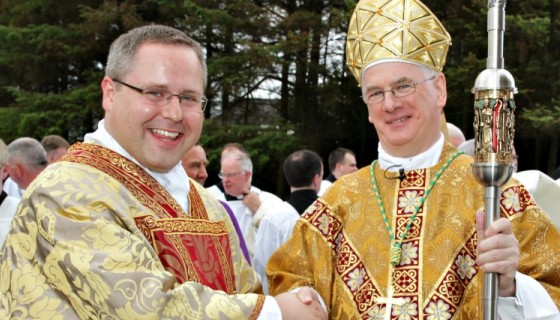 oleraine. Following his early studies at St Malachy’s Primary School, Coleraine and Loreto College, Coleraine, he pursued an undergraduate degree in Broadcasting Studies at the University of Leeds. Following his graduation in 2001, Damian worked for a number of years as a Marketing Consultant in the IT and financial services sector.
oleraine. Following his early studies at St Malachy’s Primary School, Coleraine and Loreto College, Coleraine, he pursued an undergraduate degree in Broadcasting Studies at the University of Leeds. Following his graduation in 2001, Damian worked for a number of years as a Marketing Consultant in the IT and financial services sector.
In August 2005, Damian entered St Malachy’s Seminary, Belfast where he began his formation for the priesthood and studied scholastic philosophy at Queens University Belfast. In August 2007, Damian continued his formation programme in the Pontifical Irish College, Rome where he completed a degree in Theology at the Pontifical Gregorian University. In April 2010, he was ordained a deacon and is currently completing a Licentiate in Spiritual Theology at the Pontifical University of St Thomas Aquinas.
Six Deacons Ordined at Pontifical Irish College, Rome
Six students from the Pontifical Irish College, Rome were ordained deacons on Easter Monday. The ceremony, celebrated by Dr Seamus Hegarty, Bishop of Derry, was held in the church of Santa Maria sopra Minerva in Rome. Two of the new deacons, Brendan Collins and Patrick Lagan, come from the diocese of Derry. The other candidates were Philip John Harris (Diocese of Waterford and Lismore), Ryan McAleer (Archdiocese of Armagh), Conor McGrath (Diocese of Down and Connor) and Milan Tomaga (Diocese of Banska-Bystrica, Slovakia).
This is the largest diaconate ordination class from the Pontifical Irish College in over a decade. Monsignor Liam Bergin, , rector of the Pontifical Irish College, congratulated the new deacons and noted that the Irish College shared the joy of their families and friends who had come from Ireland and Slovakia for the ordination.
During the ceremony the six candidates took a promise of celibacy, obedience and formally undertook the responsibility of praying for the Church and the world.
The new deacons will be ordained to the priesthood in their home dioceses during the coming year.
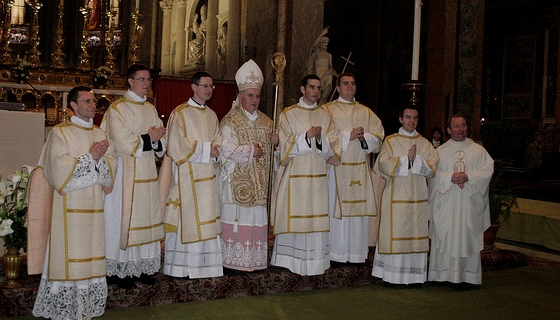
MESSAGE OF THE HOLY FATHER
FOR THE 48th WORLD DAY
OF PRAYER FOR VOCATIONS
15 MAY 2011 FOURTH SUNDAY OF EASTER
Theme: “Proposing Vocations in the Local Church”
Dear Brothers and Sisters!
The 48th World Day of Prayer for Vocations, to be celebrated on 15 May 2011, the Fourth Sunday of Easter, invites us to reflect on the theme: “Proposing Vocations in the Local Church”. Seventy years ago, Venerable Pius XII established the Pontifical Work of Priestly Vocations. Similar bodies, led by priests and members of the lay faithful, were subsequently established by Bishops in many dioceses as a response to the call of the Good Shepherd who, “when he saw the crowds, had compassion on them, because they were like sheep without a shepherd”, and went on to say: “The harvest is plentiful but the labourers are few. Pray therefore the Lord of the harvest to send out labourers into his harvest!” (Mt 9:36-38).
The work of carefully encouraging and supporting vocations finds a radiant source of inspiration in those places in the Gospel where Jesus calls his disciples to follow him and trains them with love and care. We should pay close attention to the way that Jesus called his closest associates to proclaim the Kingdom of God (cf. Lk 10:9). In the first place, it is clear that the first thing he did was to pray for them: before calling them, Jesus spent the night alone in prayer, listening to the will of the Father (cf. Lk 6:12) in a spirit of interior detachment from mundane concerns. It is Jesus’ intimate conversation with the Father which results in the calling of his disciples. Vocations to the ministerial priesthood and to the consecrated life are first and foremost the fruit of constant contact with the living God and insistent prayer lifted up to the “Lord of the harvest”, whether in parish communities, in Christian families or in groups specifically devoted to prayer for vocations.
At the beginning of his public life, the Lord called some fishermen on the shore of the Sea of Galilee: “Follow me and I will make you fishers of men” (Mt 4:19). He revealed his messianic mission to them by the many “signs” which showed his love for humanity and the gift of the Father’s mercy. Through his words and his way of life he prepared them to carry on his saving work. Finally, knowing “that his hour had come to depart out of this world to the Father” (Jn 13:1), he entrusted to them the memorial of his death and resurrection, and before ascending into heaven he sent them out to the whole world with the command: “Go, therefore, make disciples of all nations” (Mt 28:19).
It is a challenging and uplifting invitation that Jesus addresses to those to whom he says: “Follow me!”. He invites them to become his friends, to listen attentively to his word and to live with him. He teaches them complete commitment to God and to the extension of his kingdom in accordance with the law of the Gospel: “Unless a grain of wheat falls into the earth and dies, it remains alone; but if it dies, it bears much fruit ” (Jn 12:24). He invites them to leave behind their own narrow agenda and their notions of self-fulfilment in order to immerse themselves in another will, the will of God, and to be guided by it. He gives them an experience of fraternity, one born of that total openness to God (cf. Mt 12:49-50) which becomes the hallmark of the community of Jesus: “By this everyone will know that you are my disciples, if you have love for one another” (Jn 13:35).
It is no less challenging to follow Christ today. It means learning to keep our gaze fixed on Jesus, growing close to him, listening to his word and encountering him in the sacraments; it means learning to conform our will to his. This requires a genuine school of formation for all those who would prepare themselves for the ministerial priesthood or the consecrated life under the guidance of the competent ecclesial authorities. The Lord does not fail to call people at every stage of life to share in his mission and to serve the Church in the ordained ministry and in the consecrated life. The Church is “called to safeguard this gift, to esteem it and love it. She is responsible for the birth and development of priestly vocations” (John Paul II, Post-Synodal Apostolic Exhortation Pastores Dabo Vobis, 41). Particularly in these times, when the voice of the Lord seems to be drowned out by “other voices” and his invitation to follow him by the gift of one’s own life may seem too difficult, every Christian community, every member of the Church, needs consciously to feel responsibility for promoting vocations. It is important to encourage and support those who show clear signs of a call to priestly life and religious consecration, and to enable hem to feel the warmth of the whole community as they respond “yes” to God and the Church. I encourage them, in the same words which I addressed to those who have already chosen to enter the seminary: “You have done a good thing. Because people will always have need of God, even in an age marked by technical mastery of the world and globalization: they will always need the God who has revealed himself in Jesus Christ, the God who gathers us together in the universal Church in order to learn with him and through him life’s true meaning and in order to uphold and apply the standards of true humanity” (Letter to Seminarians, 18 October 2010).
It is essential that every local Church become more sensitive and attentive to the pastoral care of vocations, helping children and young people in particular at every level of family, parish and associations – as Jesus did with his disciples – to grow into a genuine and affectionate friendship with the Lord, cultivated through personal and liturgical prayer; to grow in familiarity with the sacred Scriptures and thus to listen attentively and fruitfully to the word of God; to understand that entering into God’s will does not crush or destroy a person, but instead leads to the discovery of the deepest truth about ourselves; and finally to be generous and fraternal in relationships with others, since it is only in being open to the love of God that we discover true joy and the fulfilment of our aspirations. “Proposing Vocations in the Local Church” means having the courage, through an attentive and suitable concern for vocations, to point out this challenging way of following Christ which, because it is so rich in meaning, is capable of engaging the whole of one’s life.
I address a particular word to you, my dear brother Bishops. To ensure the continuity and growth of your saving mission in Christ, you should “foster priestly and religious vocations as much as possible, and should take a special interest in missionary vocations” (Christus Dominus, 15). The Lord needs you to cooperate with him in ensuring that his call reaches the hearts of those whom he has chosen. Choose carefully those who work in the Diocesan Vocations Office, that valuable means for the promotion and organization of the pastoral care of vocations and the prayer which sustains it and guarantees its effectiveness.
I would also remind you, dear brother Bishops, of the concern of the universal Church for an equitable distribution of priests in the world. Your openness to the needs of dioceses experiencing a dearth of vocations will become a blessing from God for your communities and a sign to the faithful of a priestly service that generously considers the needs of the entire Church.
The Second Vatican Council explicitly reminded us that “the duty of fostering vocations pertains to the whole Christian community, which should exercise it above all by a fully Christian life” (Optatam Totius, 2). I wish, then, to say a special word of acknowledgment and encouragement to those who work closely in various ways with the priests in their parishes. In particular, I turn to those who can offer a specific contribution to the pastoral care of vocations: to priests, families, catechists and leaders of parish groups. I ask priests to testify to their communion with their bishop and their fellow priests, and thus to provide a rich soil for the seeds of a priestly vocation. May families be “animated by the spirit of faith and love and by the sense of duty” (Optatam Totius, 2) which is capable of helping children to welcome generously the call to priesthood and to religious life. May catechists and leaders of Catholic groups and ecclesial movements, convinced of their educational mission, seek to “guide the young people entrusted to them so that these will recognize and freely accept a divine vocation” (ibid.).
Dear brothers and sisters, your commitment to the promotion and care of vocations becomes most significant and pastorally effective when carried out in the unity of the Church and in the service of communion. For this reason, every moment in the life of the Church community – catechesis, formation meetings, liturgical prayer, pilgrimages – can be a precious opportunity for awakening in the People of God, and in particular in children and young people, a sense of belonging to the Church and of responsibility for answering the call to priesthood and to religious life by a free and informed decision.
The ability to foster vocations is a hallmark of the vitality of a local Church. With trust and perseverance let us invoke the aid of the Virgin Mary, that by the example of her own acceptance of God’s saving plan and her powerful intercession, every community will be more and more open to saying “yes” to the Lord who is constantly calling new labourers to his harvest. With this hope, I cordially impart to all my Apostolic Blessing.
From the Vatican, 15 November 2010
